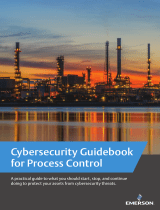Symantec SIEM 9751 Hardware Installation Manual
- Type
- Hardware Installation Manual
This manual is also suitable for
Symantec SIEM 9751 is designed to provide a high-performance, scalable security information and event management (SIEM) solution. It is able to collect, analyze, and store security events from a wide range of sources, including network devices, servers, applications, and security devices. The 9751 can also be used to generate reports and alerts, and to provide real-time visibility into security events. It is able to detect and respond to security threats in a timely manner, helping to protect your organization from data breaches, compliance violations, and other security incidents.
Symantec SIEM 9751 is designed to provide a high-performance, scalable security information and event management (SIEM) solution. It is able to collect, analyze, and store security events from a wide range of sources, including network devices, servers, applications, and security devices. The 9751 can also be used to generate reports and alerts, and to provide real-time visibility into security events. It is able to detect and respond to security threats in a timely manner, helping to protect your organization from data breaches, compliance violations, and other security incidents.
















-
 1
1
-
 2
2
-
 3
3
-
 4
4
-
 5
5
-
 6
6
-
 7
7
-
 8
8
-
 9
9
-
 10
10
-
 11
11
-
 12
12
-
 13
13
-
 14
14
-
 15
15
-
 16
16
-
 17
17
-
 18
18
-
 19
19
-
 20
20
-
 21
21
-
 22
22
-
 23
23
-
 24
24
-
 25
25
-
 26
26
-
 27
27
-
 28
28
-
 29
29
-
 30
30
-
 31
31
-
 32
32
-
 33
33
-
 34
34
-
 35
35
-
 36
36
-
 37
37
-
 38
38
-
 39
39
-
 40
40
-
 41
41
-
 42
42
-
 43
43
-
 44
44
-
 45
45
-
 46
46
Symantec SIEM 9751 Hardware Installation Manual
- Type
- Hardware Installation Manual
- This manual is also suitable for
Symantec SIEM 9751 is designed to provide a high-performance, scalable security information and event management (SIEM) solution. It is able to collect, analyze, and store security events from a wide range of sources, including network devices, servers, applications, and security devices. The 9751 can also be used to generate reports and alerts, and to provide real-time visibility into security events. It is able to detect and respond to security threats in a timely manner, helping to protect your organization from data breaches, compliance violations, and other security incidents.
Ask a question and I''ll find the answer in the document
Finding information in a document is now easier with AI
Related papers
Other documents
-
Monacor JTS SIEM-2/5 User manual
-
Dell Data Guardian User guide
-
Dell Data Guardian User guide
-
 DeltaV CYBERSECURITY User guide
DeltaV CYBERSECURITY User guide
-
Broadcom Securing Cloud Applications & Services: An Executive User guide
-
Broadcom Buyer?s: Privileged Access Management User guide
-
Dell Data Guardian User guide
-
Manitowoc Ice MAF-67 User manual
-
Xerox AltaLink B8145 / B8155 / B8170 Administration Guide
-
Xerox AltaLink B8145 / B8155 / B8170 Administration Guide


















































